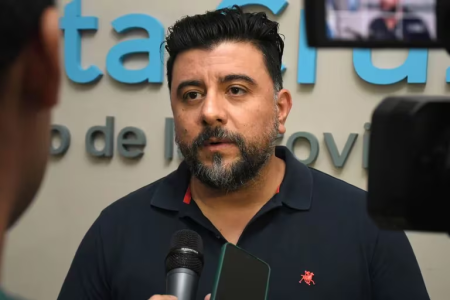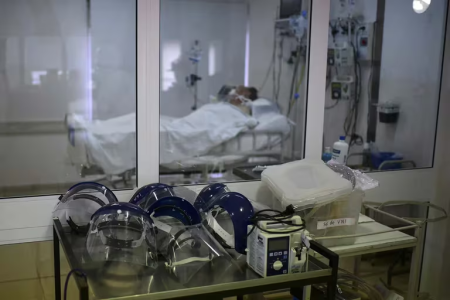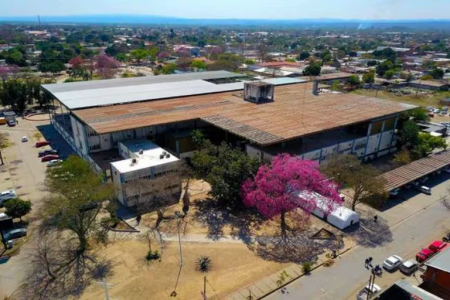All the Answers
Well-known member
The government of Santa Cruz explained why it will begin charging foreigners for care in public hospitals - Infobae

Source:

El gobierno de Santa Cruz explicó por qué comenzará a cobrarles a los extranjeros la atención en hospitales públicos
“La prioridad para nosotros son nuestros residentes santacruceños”, señaló el ministro de Salud y Ambiente provincial. La medida -indicó- prevé un ahorro de entre el 15 y el 20% del presupuesto mensual en salud
April 18, 2024
“The priority for us is our Santa Cruz residents,” said the provincial Minister of Health and Environment. The measure, he indicated, foresees a saving of between 15 and 20% of the monthly health budget.
By Lara Lukaszewicz

Ariel Varela, Minister of Health and Environment of Santa Cruz (Government of Santa Cruz)
The Ministry of Health and Environment of Santa Cruz announced yesterday that it will begin charging foreigners for medical care in its public health centers. The initiative includes all those who are “transitional residents” in the province, in line with the measure adopted by Salta in March .
“We have statistical data that, more or less, 1,800 people (from other countries) are treated monthly in all the hospitals in the province. Today, as the health system is at the national and provincial level, unfortunately we are experiencing an enormous economic deficit. Obviously, the priority for us is our Santa Cruz residents ,” said Ariel Varela , head of the provincial Ministry of Health and Environment, in dialogue with Infobae .
As detailed, the charge will be 50% above what the hospital nomenclature establishes , that is, what it costs the health center. Thus, hospitalization in a bed in a medical clinic would cost between 150 thousand and 180 thousand pesos per day. Complex services, such as therapy, MRIs, CT scans, and surgeries, will have a greater impact.

The charge will be 50% above what the hospital nomenclature establishes, that is, what it costs the health center (Photo by RONALDO SCHEMIDT / AFP)
The minister clarified that the resolution that will make the measure official will be published in the Official Gazette of the Province in the next 24 hours. By way of background, in Salta, since care in public hospitals was charged, the attendance of foreigners fell by more than 80%.
Along these lines, Minister Varela maintained that of the 1,800 foreigners who use public medical services, 70% are Chilean residents . “Let's not forget that we have a very touristy town, such as Calafate, where many tourists from all over the world come temporarily. “That also greatly influences attention,” he stressed.
Through charging for care, the provincial ministry anticipates savings of between 15 and 20% of the monthly budget allocated to Health.
As detailed, foreigners come to Santa Cruz in search of, among other things, consultations with specialist doctors, surgical procedures, births and diagnostic imaging studies: "It entails a health expense that is important for the province."

“Let's not forget that we have a very touristy town, such as Calafate, where many tourists from all over the world come temporarily. “That also greatly influences attention,” indicated the minister (REUTERS/Agustin Marcarian/File)
Asked if the resolution will include those foreigners who have a precarious residence in the province, the official said: “ No, our spirit is not to charge people who are precarious. We have foreign residents who are obviously already living in our province and some are very precarious. They present a hospital card and are treated in our public hospitals.”
Emergencies, understood as those that “carry a risk of life”, will be attended to normally. Now, what will the protocol be like in the event that a person receives care and then refuses to pay the fee , as recently happened with a Bolivian woman in Salta ?: “Our idea is to try to collect the care sooner. Legal Counsel is framing all of these issues if they arise, so we are in that process as well. “Our lawyers will obviously act in situations where these problems arise.”
On the other hand, he assured that the resolution will not affect the Argentina-Chile Health Cooperation Agreement , which establishes that both countries must provide medical assistance in public hospitals in emergency cases, “without a prior or subsequent claim for obtain payment for medical care provided.”
This agreement applies to cases of citizens who are in the territory of the neighboring country, without being permanent residents and who do not have the means to cover the cost of care: “This is a reciprocity agreement between brother countries, the idea is a joint work in case there is an accident or risk of life, because our routes are permanently connected.”

A Bolivian woman went to give birth at a public hospital in Salta, refused to pay for medical care and was reported.
Health policies and inheritance
On the other hand, Ariel Varela expanded on the inheritance received in the area by the government of Alicia Kirchner. “I received a health portfolio destroyed economically, due to poor administration, with enormous overpricing in the purchase of supplies. We have 14 hospitals that are very deteriorated in every sense: structural, lack of professionals and lack of health policies that really benefit the community. The truth is that it is a complex and critical situation of what is happening in Santa Cruz,” he explained.To this panorama, we must add that the National Government announced the cut of 140 billion pesos in the Ministry of Health : “Let us not forget that there was an inflation of approximately 239% in the last time in supplies and medicines. The truth is that it is a complex situation in health issues, which is why the measures that are being taken are also to protect medical care and prioritize it for the people of Santa Cruz.”

